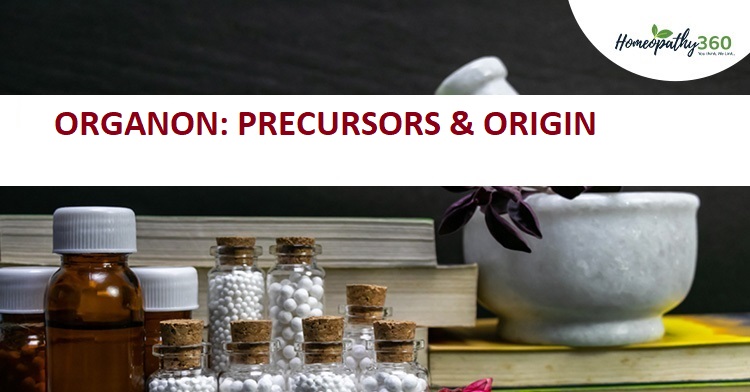
The word ‘Organon’ is a Greek derivation of the word Organum, which means:
- Tool; Instrument
- Instrument of thought, system of logic
- An instrument for acquiring knowledge
specifically: a body of principles of scientific or philosophical investigation (Merrium Webster Dictionary)
- An instrument for effecting in best manner a certain end (according to Richard Hughes)
The use of the word before Hahnemann:
The word ‘Organon’ was used for the first time by the great Greek philosopher Aristotle (384-312 BC). His various treatises on Logic were summed up under the common title ‘Organon’. Under the name of ‘Organon’ he designed 6 treatises (a written work dealing formally & systematically with a subject) which relate to logic. (Logic means – The study of reasoning; the study of the origin and natural sequence of fundamental idea)
Later on, the word Organon was used by Lord Francis Bacon (1561-1626 AD) wrote a book on logic in Latin named ‘Novum Organum’ (New Organon), a work incomplete, which was to form the second volume of his ‘Instauratio Magna’ (1st part was- ‘De augmentis scientiarun’).
These two must have influenced Hahnemann to name his book as Organon.
Dr Richard Hughes writes in his book, ‘The Principles and Practice of Homoeopathy’, that:
“Why did he give his treatise this name? He must, there can be little doubt, have had Aristotle in memory, whose various treatises on Logic were summed up under the common title “Organon.” Logic – the art of reasoning – is the INSTRUMENT of research and discovery: Hahnemann designed his method as one which should be a medical logic, an instrument which the physician should use for the discovery of the best remedies for diseases. But the example immediately before his mind, and through whom he was probably led to Aristotle, must have been Bacon. The second treatise of the ” Instauratio Magna ” of the English Chancellor is entitled “Novum Organum”: it was the setting forth of a new mode of reasoning, which in scientific research should supersede that of Aristotle, and lead to developments of knowledge hitherto unattained. That Hahnemann should aspire to do such work for medicine as was done for science in general by Bacon has been scouted by his enemies, and even deprecated by his friends, as presumption. And yet no comparison could better illustrate the real position of the man both in its strength and in its weakness. If he erred as to special points of Pathology, and even of practice, we must remember that Bacon was a doubtful acceptor of the Copernican Astronomy and ridiculed Harvey’s doctrine of the circulation, while he saw no difficulty in the transmutation of metals. But, on the other side, how truly Baconian is the whole spirit and aim of the “Organon”! Like his great exemplar, Hahnemann sought to recall men from the spinning of thought-cobwebs to the patient investigation of facts. Like him, he set up the practical-which in this case is the healing of disease-as the proper aim of medical Philosophy; not seeking “in knowledge a terrace, for a wandering and variable mind to walk up and down with a fair prospect,” but rather accounting it “a rich store-house, for the glory of the Creator, and THE RELIEF OF MAN’S ESTATE.” Like him, his chief strength was devoted to the exposition and perfecting of his proposed method of further progress towards this end, leaving to the future the carrying it into effect. Another Descartes may arise in medicine whose perception of special fields of knowledge may be keener, and who may leave his mark more clearly traced on certain branches of our art. But Hahnemann, when once his method shall have won the acceptance we claim for it will ever be reckoned as the Bacon of Therapeutics – the fruitful thinker who taught us what was our great aim as physicians and how we should best attain to it.”
THE ORGANON OF MEDICINE
Organon of Medicine is a book written by Master Samuel Hahnemann. It contains the principles of homoeopathy along with the critical analysis of the different other modes of treatment prevalent during Hahnemann’s time.
This book is considered to be an Instrument of Medical art. It is a book of principles for studying and practicing medicine. It is an instrument to know, to experience, to practice.
In the form of Organon, the author is giving the physician an instrument, a help, a method to achieve his goal, which is to cure disease, to relieve suffering and to prevent diseases. His object of writing Organon is not to impose a new system, but to hand over this instrument, this tool to the physicians.
The state of medicine during Hahnemann’s time was an absolute chaos. The entire medical community was trying to seek truth and was looking for an appropriate instrument for doing so. During that time Hahnemann wrote Organon for searching a new instrument which may help to serve the suffering humanity.
The aim of writing ORGANON OF MEDICINE was to present to the medical profession, the doctrines, principles, merits and the practical instructions for the practice of homoeopathic art of healing in a systematic, logical and elaborate manner. Here, Master Hahnemann criticized the prevailing system of medicine and established the superiority of homoeopathy.
The work of ORGANON is an achievement from history and philosophy by Hahnemann – His own Magnum Opus.
ORGANON OF MEDICINE is “His exposition and vindication of his therapeutics methods”, as stated by Richard Haehl.
The original work was in GERMAN with six editions published till date.
Pierre Schmidt: Organon is for the physicians, the means of acquiring knowledge which will enable him to discharge the duties of this profession in the most perfect way.
PRECURSORS OF THE ORGANON
Organon of Medicine had been preceded by a number of essays in HUFELAND’S JOURNAL – the leading medical organ of the time, in Germany. Of these the most noteworthy were – “On a New Principle for ascertaining the Curative Powers of Drugs” (1792); “Are the obstacles to certainty and simplicity in Practical Medicine insurmountable?” (1797); and “The Medicine of Experience” (1806). Two among these acted as the Precursors of the Organon.
About them, Dr R. E. Dudgeon has mentioned in the Translator’s Preface of the Organon of Medicine. He writes:
“…I have also indicated the corresponding views as set forth in the Essay on a New Principle and the Medicine of Experience, both of which essays may be regarded as the precursor of the ORGANON…”
- ESSAY ON A NEW PRINCIPLE FOR ASCERTAINING THE CURATIVE POWERS OF DRUGS WITH A REVIEW OF THOSE HITHERTO EMPLOYED
- It was published in 1796 in Hufeland’s Journal
- German name:
Versuch veber ein neucs, Princip zur Auffindungder Heilkrafte der Arzneisubstanzer, nebset einigen Blicken auf de bisberigen
- It had nearly 50 pages, a total of 170 paragraphs and 29 footnotes.
- It was translated into English by Dr. R. E. Dudgeon.
- MEDICINE OF EXPERIENCE
- It was published in 1806 in Hufeland’s Journal
- German name:
Heilkunde der Erfahrung
- It was written in the form of an essay. It contains 176 paragraphs and 48 footnotes





